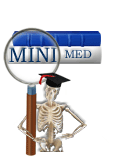Here are short biographies for our Mini-Med lecturers:
 Dr. James Hanley
Dr. James Hanley
Epidemiology: Unraveling Medical Mysteries
October 21, 2014
James Hanley began his career as a medical statistician in multi-centre cancer clinical trials. Since joining McGill in 1980, he has collaborated widely in medical and community health research -- from pediatrics to geriatrics. His current work focuses on cancer screening. He has received the Principal’s Award for teaching excellence. He is known for his hands-on style, his ‘expository’ articles explaining concepts and methods in epidemiology and biostatistics, and his Irish-style recounting of medical and statistical history.
 Dr. Michael Kramer
Dr. Michael Kramer
Older Mothers, Fewer Babies, More Interventions: The Changing Landscape of Childbirth
October 28, 2014
Dr. Michael S. Kramer is James McGill Professor in the Departments of Pediatrics and of Epidemiology and Biostatistics at McGill University Faculty of Medicine. He has been a National Health Research Scholar and National Health Research Scientist of Health Canada’s National Health Research and Development Program (NHRDP), a Chercheur-boursier senior (senior research scientist) of the Fonds de la recherche en santé du Québec (FRSQ), and a Distinguished Scientist of the Canadian Institutes of Health Research (CIHR). He has been principal investigator on several large, multicentre epidemiologic studies and randomized trials in the general area of maternal and child health. A member of four expert committees of the U.S. Institute of Medicine, in 1997-98 Dr. Kramer served as President of the Society of Pediatric and Perinatal Epidemiologic Research. From 1995-2001, he chaired the Steering Committee of the Canadian Perinatal Surveillance System and until May 2003, chaired the Institute Advisory Board of CIHR’s Institute of Human Development and Child and Youth Health (IHDCYH). He served as IHDCYH’s Scientific Director from 2003 to 2011. He has received operating grant support from the Medical Research Council (now CIHR) of Canada, NHRDP, NIH, FRSQ, and the March of Dimes. In 2011, Dr. Kramer was elected a Fellow of the Royal Society of Canada in the Life Sciences Division of the Academy of Science.
Dr. Kramer has authored or co-authored 20 books and monographs, and has published over 350 original articles. His systematic review of the evidence on the optimal duration of exclusive breastfeeding led directly to new infant feeding recommendations by WHO and the World Health Assembly. His current principal areas of research are the continued follow-up of Belarusian children from the Promotion of Breastfeeding Intervention Trial (PROBIT); the effects of increasing induction and cesarean delivery on birth weight, gestational age, and maternal/fetal/infant morbidity and mortality; new epidemiologic and statistical methods for analysis of fetal growth, timing of birth, and fetal/infant mortality; and international comparisons in preterm birth and fetal/infant mortality.
 Dr. Samy Suissa and
Dr. Samy Suissa and  Dr. Pierre Ernst
Dr. Pierre Ernst
Are Medications Safe? The Good, The Bad and The Ugly
November 4, 2014
Dr. Samy Suissa
Professor Suissa, who heads the Canadian Network for Observational Drug Effect Studies (CNODES), has received the Distinguished Investigator award from the Canadian Institute of Health Research (CIHR) of Canada and the prestigious FC Donders Professorship Award from Universiteit Utrecht, Netherlands. He conducts epidemiological studies on the risks and benefits of medications for the treatment of several chronic diseases, and is the author of over 360 peer-reviewed research papers. He served on the Board of Directors of several scientific societies and sits on the editorial boards of various scientific journals.
Dr. Pierre Ernst
Pierre Ernst graduated in Medicine from Université de Montreal, completed internal medicine and pulmonary training at McGill University, after which he completed an MSc in Epidemiology and Biostatistics at McGill. He is currently an attending physician in the Pulmonary Division of the Department of Medicine at the Jewish General Hospital and a Professor of Medicine at McGill University.
Dr. Ernst’s current research activities centre on the safety of medications as used in the general population after approval for commercialization. He is an investigator with the Canadian Network for Observational Drug Effect Studies (CNODES), which collaborates with the Drug Safety and Effectiveness Network (DSEN), and is funded by the Canadian Institutes for Health Research (CIHR).
 Dr. Jean-Francois Boivin
Dr. Jean-Francois Boivin
Epidemiology and Public Health: 1950 - 2014
November 11, 2014
Dr. Boivin holds a medical degree from Laval University (Québec, 1973) and a doctoral degree in epidemiology from Harvard University (1981). He completed a medical specialty in community medicine at the Université de Montréal (1990). He is a Full Professor in the Department of Epidemiology, Biostatistics, and Occupational Health of McGill University. He is also a consultant in infectious diseases, Department of Public Health, Montréal General Hospital, and a staff investigator, Centre for Clinical Epidemiology and Community Studies, Sir Mortimer B. Davis Jewish General Hospital. He also practices addiction medicine at the Herzl Family Practice Center of the Jewish General Hospital. Dr. Boivin has conducted epidemiologic research in a number of domains, including screening, health services organization, the health of street youth, drug injection practices and infections, and drug injection behaviors. He has published over 150 peer-reviewed papers.
Dr. Boivin is currently a member of the Advisory Board of the CIHR (Canadian Institutes of Health Research) Institute of Neurosciences, Mental Health and Addiction, and of the Board of Directors of the Canadian Center on Substance Abuse.
 Dr. Robyn Tamblyn
Dr. Robyn Tamblyn
The Digital Revolution: Electronic Medical Records and Prescriptions
November 18, 2014
Dr. Robyn Tamblyn is a Professor in the Department of Medicine and the Department of Epidemiology and Biostatistics at McGill University. She is a James McGill Chair, a Medical Scientist at the McGill University Health Center Research Institute, and the Scientific Director of the Clinical and Health Informatics Research Group at McGill University. Dr Tamblyn’s ground-breaking research on educational outcomes has elucidated important relationships between health professional training, licensure and practice that have subsequently guided credentialing policies. Her work on prescription drug use, its determinants, and computerized interventions to improve drug safety (MOXXI) have been recognized internationally. She leads a CIHR-funded team to investigate the use of e-health technologies to support integrated care for chronic disease, and co-leads a Canadian Foundation for Innovation Informatics Innovation Laboratory to create advanced technologies to monitor adverse events in populations and create new tools to improve the safety and effectiveness of health care. Her work is published in the Journal of the American Medical Association, the Annals of Internal Medicine, the British Medical Journal, Medical Care, and Health Services Research, among others. She has been awarded the CHSRF KT award for her research in improving the use of medication, the ACFAS Bombardier award for innovation in the development of a computerized drug management system and the John P. Hubbard Award by the NBME for her contribution to the assessment of professional competency and educational program development in medical education and delivery of healthcare. In January 2011, she became the Scientific Director of the Institute of Health Services and Policy Research at the Canadian Institutes of Health Research.
 Dr. Nitika Pai and
Dr. Nitika Pai and  Dr. Madhukar Pai
Dr. Madhukar Pai
Diagnostics at Work: From the Clinic to the Community
November 25, 2014
Dr. Nitika Pant Pai
Nitika Pant Pai, MD MPH PhD, is an Assistant Professor at McGill University in the Department of Medicine and a Research Scientist at the MUHC Research Institute. She is a physician/public health professional with a doctorate in Epidemiology from the University of California, Berkeley with a CIHR/CTN post-doctoral fellowship from McGill University.
She has a decade of experience in the design and conduct of implementation research with rapid point-of-care diagnostic tests for HIV and related co-infections (i,e, Hepatitis C, Hepatitis B, Syphilis). Her research vision is to develop innovative screening strategies for HIV and co-infections with point of care tests, so as to inform, and change policies in the country of research and internationally. Her current focus is on developing innovative strategies for in home, self-testing for HIV in South Africa and Canada, and multiplexed integrated screening strategies for India and Canada. She has conducted studies in diverse marginalized populations in domestic and international settings: incarcerated populations in the United States, immigrants, injection drug users, students, in Canada, and pregnant women and STD clinic attendees in India, and healthcare workers in South Africa. Her research work is supported by grants from the Canadian Institutes of Health Research, Grand Challenges Canada, and the Bill and Melinda Gates Foundation.
She is a recipient of numerous awards: CIHR New Investigator award 2010, Grand Challenges Canada’s Stars in Global Health Award 2011 and 2013, McMaster’s University Chanchlani Award for Excellence in Global Health Research in 2012, and McGill University’s Maude Abbott Award 2013 for research excellence. In 2013, she and her team developed an innovative HIV self-testing strategy that received the Accelerating Science Award Program (ASAP) Google, PLOS and Wellcome Trust.
Dr. Madhukar Pai
Madhu Pai did his medical training and community medicine residency in Vellore, India. He completed his PhD in epidemiology at UC Berkeley, and a postdoctoral fellowship at the UCSF. He is currently an associate professor of epidemiology at McGill University in Montreal, and an Associate Director of the McGill International TB Centre. In addition, he serves as a Consultant for the Bill & Melinda Gates Foundation. He also serves on the Scientific Advisory Committee of the Foundation for Innovative New Diagnostics, Geneva. Madhu has previously served as co-chair of the Stop TB Partnership's Working Group on New Diagnostics. He is on the editorial boards of Lancet Infectious Diseases, PLoS Medicine, International Journal of TB and Lung Disease, among others.
Madhu’s research is mainly focused on improving the diagnosis of tuberculosis, especially in high-burden countries like India and South Africa. His research is supported by grant funding from the Gates Foundation, Grand Challenges Canada, and Canadian Institutes of Health Research. He has more than 200 peer-reviewed publications. He is recipient of the Union Scientific Prize, Chanchlani Global Health Research Award, and Stars in Global Health award from Grand Challenges Canada.
